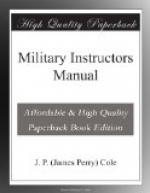Do not omit to post sentinels over the water supply and at important points, even though you have not decided upon the exact location of camp.
Organize the work by platoons or squads and rotate, if camp is to be made every few days.
Discipline in camp means more than order and dispatch, however, men must understand that they are under discipline when off duty—that they cannot disregard sanitary measures, eat promiscuously, destroy property, vegetation, or timber and must police the grounds at all times. Papers, cigarette butts, and newspapers, should never be allowed on the ground near camp. Eatables should never be kept in tents to draw vermin. Where possible, in dry weather, the company street should be wet down to keep the dust out of the tents. Have men ditch around tents immediately upon making camp. Though it may seem somewhat of a hardship, a sudden down pour of rain, will recompense them for this labor many times over. In ditching the tents, completely circle them, for if this is not done a great deal of rain will come in the front of the tent.
Food means everything to a soldier. The camp cooking is a barometer of the organized efficiency and of the enlisted men’s attitude. Nothing else can do so much to help or hinder.
The Company Commander should realize the controlling power exercised by the company cook and keep the matter in his own hands. He should accept no excuse for burnt or dirty food.
If officers mess with their companies they will appreciate the attitude of the men and be able to judge the real situation. Officers will be well repaid for doing this, as it gives them an idea of the food that is being served their men.
In the mechanical details of preparing food, the fire is of first importance. A quick method of cooking is by laying a pair of large green logs on the surface of the ground just wide enough to place the pots between them, so that the bottom of the pots will be resting upon them. Build a fire between these logs, making sure to place the logs parallel to the direction of the wind.
A pit may be dug, with a sloping bottom, and across this may be placed the pots, and if iron rails are available, the utensils may be placed on these. For longer stays this pit may be lined with stone. Stones retain the heat and less wood is required. Four trenches radiating from a central chimney will give one flue whatever may be the direction of the wind. (For more specific data on the subject of fires and camp cooking, see Manual for Army Cooks—U.S.A.—also notes in i.d.r., pp. 154-155.)
Make a rule never to allow food to remain in tin cans after opening them. Remember to place kitchen near available water supply and furthest from latrines, horse picket lines, or dumps of any kind.
Sanitation comes last in the thoughts of the enlisted man, but it is no less important for that.




